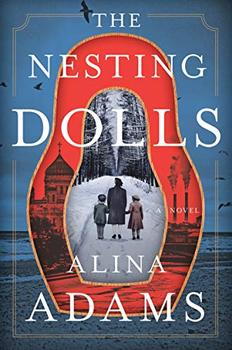Summary | Excerpt | Reviews | Beyond the Book | Readalikes | Genres & Themes | Author Bio

Prologue
2019
"Love is not a potato," Zoe's great-grandmother Alyssa had been telling her since before Zoe was old enough to know for certain what either word meant.
Zoe hoped her confusion was merely a language barrier. Her great-grandmother spoke Russian—and some German. Zoe spoke English—and some Russian. Neither spoke Yiddish. Her great-grandmother was very proud of this.
"Because," Zoe's great-grandmother explains, in Russian, "when love goes bad, you cannot throw it out the window." In Russian, okoshka (window) rhymes with kartoshka (potato).
"What Balissa means," Zoe's mother, Julia, chimes in, using the portmanteau Zoe gave her great-grandmother as a baby. This is what happens when three generations of women—and one so-genial-they-sometimes-forget-he's-in-the-room man—share a three-bedroom apartment in Brighton Beach, Brooklyn. There's no such thing as a private conversation. For this we left the Soviet Union?
Then again, this is the neighborhood where a faded metal sign off the elevated subway welcomes you to brighton beach: a whole new world!, while the majority of residents are doing their best to turn it into the old one. Want to buy something in a restaurant or store and don't speak Russian? Good luck with that! On the other hand—sales tax? What's that? To paraphrase Leona Helmsley, in Brighton, only the English speakers pay taxes.
You'd think, with her mother having been born in America, and Zoe having been born in America, they'd speak the same language. You'd be wrong. Mama jokes that she's stuck between languages; she's starting to forget Russian but hasn't learned English yet. Mama communicates in Russian, at home and at work, with a few English words thrown in, like "okay," "parking" (rather, a hybrid, za-PARK-ovat), and "mobile phone" (aka MOBIL-ney). "What Balissa means"—Mama's lips flatten against each other and purse out. She resembles a platypus in a pink housecoat, needles stuck through the lapel, ready for any sewing emergency— "is there's nothing more important than choosing the right person to spend your life with."
"She is right." Oh, good, another nation heard from. It's the first thing Zoe's grandmother has said since Zoe arrived to help plan her grandparents' forty-fifth-anniversary party.
Baba Natasha is in a snit, shuffling from living room to kitchen, silently sliding a stack of cherry pirozhki the size of an open hand onto the lacquered coffee table alongside marmalades of many colors that look like orange slices with sugar shells. Snits should never prevent eating.
Zoe asked Mama, when they began planning the big day weeks ago, why Baba is so against a party in her honor. She's usually all about being venerated. It doesn't take much to get her talking about the academic gold medal she almost earned in school, if a vengeful instructor hadn't decided to teach Baba a lesson. There was also anti-Semitism involved. In Baba's stories, anti-Semitism is always involved. She is equally happy to boast about how she's circumvented the Americans' tax system, using their own rules against them. "So easy! Why does everyone not to do this?" Problems begin when Baba feels the family isn't gushing over her enough. At Zoe's NYU graduation, Baba made a point of telling everyone she wasn't some ignorant, immigrant grandmother, but, "I hold the degree in mathematics, also!" And God help anyone who forgets to call, email, or send flowers on March 8, International Women's Day. And then again on American Mother's Day.
"I deserve both!" Baba says.
Zoe lives in terror of Baba discovering Grandparents Day is a thing.
Baba's birthdays are major celebrations, necessitating more flowers, a gift (with receipt included; she says it's so she has the option to exchange it, but Zoe suspects Baba needs to know how much it cost), a dinner in her honor (where she always snatches up the bill; she says it's so she can make sure they charged the table properly and no one overcalculated the tip, but Zoe thinks it's so the assembled can chime in about how she can't be expected to pay, please, let us, it would be an honor), and several toasts that extol the unparalleled wonder that is her.
Excerpted from The Nesting Dolls by Akina Adams. Copyright © 2020 by Akina Adams. Excerpted by permission of Harper. All rights reserved. No part of this excerpt may be reproduced or reprinted without permission in writing from the publisher.
Use what talents you possess: The woods would be very silent if no birds sang there except those that sang best
Click Here to find out who said this, as well as discovering other famous literary quotes!
Your guide toexceptional books
BookBrowse seeks out and recommends the best in contemporary fiction and nonfiction—books that not only engage and entertain but also deepen our understanding of ourselves and the world around us.